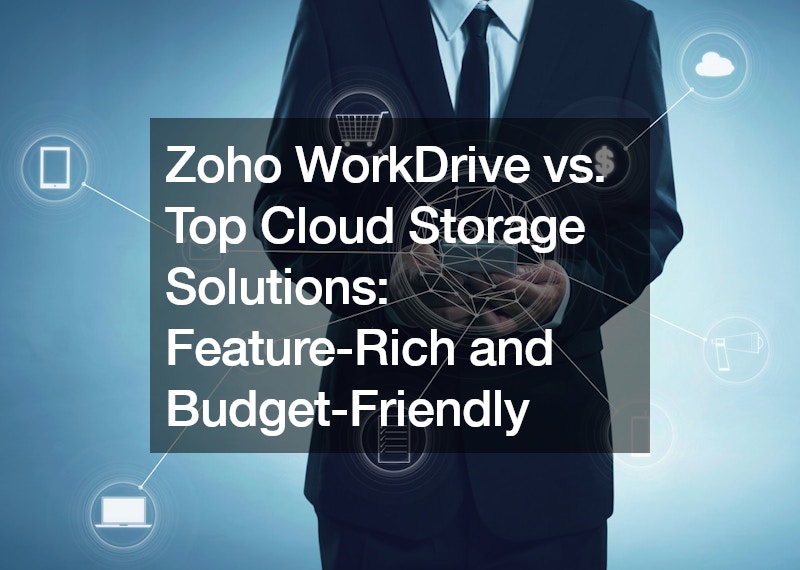In today’s digital age, efficient and secure cloud storage is crucial for businesses of all sizes. With a myriad of options available, selecting the right cloud storage solution can be daunting. Among the top contenders are Zoho WorkDrive, Google Drive, Dropbox, OneDrive, and Box. Each offers unique features and pricing structures.
However, Zoho WorkDrive stands out for its extensive features and cost-effectiveness, making it a compelling choice for many organizations. Let’s dive into a detailed comparison to see how Zoho WorkDrive stacks up against its competitors.
Comprehensive Features of Zoho WorkDrive
1. Built-in Office Suite:
Zoho WorkDrive includes an integrated office suite with Writer (word processor), Sheet (spreadsheet), and Show (presentation software). This eliminates the need for additional office apps, allowing users to create, edit, and share documents directly online. The inclusion of an MS Office add-on also enables seamless editing and storage of files within the WorkDrive environment.
2. Broad File Format Support:
File compatibility is crucial for business operations. Zoho WorkDrive supports a wide range of file formats for previewing documents online. This flexibility ensures that businesses can handle diverse file types without compatibility issues. Interestingly, Zoho WorkDrive and OneDrive lead in this area, supporting more formats than Google Drive, which offers the least.
3. Asynchronous Communication Tool:
Zoho WorkDrive’s WorkDrive Snap is an asynchronous communication tool that allows users to record screens, add video or audio commentary, and share messages with their team. This feature is ideal for creating pitch updates or announcements, fostering effective communication even in remote work setups. Dropbox and Box also offer similar tools, but they are absent in OneDrive and Google Drive.
4. Robust File Version History:
Accessing previous versions of files is essential, especially during collaborative projects. Zoho WorkDrive excels by offering unlimited file version history, ensuring that users never lose important data. In comparison, Google Drive offers only 100 versions for 30 days, while Box provides 25 to 100 versions depending on the plan.
5. Extensive Integrations:
Zoho WorkDrive integrates seamlessly with over 1,000 apps via Zoho Flow and Zapier, supporting popular tools like Microsoft Office, CapCut, and Adobe. This wide range of integrations ensures that businesses can streamline their workflows efficiently. Box, with 1,500 integrations, and Dropbox, with 220, also offer extensive connectivity, while OneDrive supports around 30 apps.
Security and Compliance
Security and compliance are pivotal for any cloud storage solution. Zoho WorkDrive, Google Drive, and OneDrive offer robust security features to protect sensitive data. These include granular permissions, single sign-on, device management, and custom branding.
Box and Dropbox also provide strong security measures and compliance standards, making them reliable options for businesses needing comprehensive data protection. For maximum security, you may consider options for backup Box & Dropbox while also evaluating their specific compliance features and pricing structures to ensure they meet your organization’s needs.
Lastly, all these platforms adhere to major compliance standards such as GDPR and HIPAA, although Box reserves HIPAA compliance for its Enterprise plan only.
Pricing Comparison
Pricing is a critical factor, especially for businesses looking to scale their operations without breaking the bank. Here’s a breakdown of the pricing for each cloud storage service:
- Zoho WorkDrive: Plans are priced at $2.50, $4.50, and $9 per month per user, billed annually. These plans offer 1TB, 3TB, and 5TB of shared team storage, respectively, for up to 10 users. Beyond 10 users, additional shared storage is provided at 100GB, 300GB, and 500GB per new user based on the chosen plan. Most features are included even in the starter plan, making it an economical choice.
- Dropbox: Pricing is $8, $20, and $26 per month per user, offering 3TB, 9TB, and 15TB of storage for the entire team. While Dropbox provides substantial storage, it is relatively more expensive.
- Box: Priced at $20, $30, and $35 per month per user, Box offers unlimited storage but imposes a bandwidth limit of 1TB per month per user, covering both upload and download activities.
- OneDrive: Plans are available at $5, $6, and $12.50 per month per user, each offering 1TB of storage per user. This makes OneDrive a cost-effective option for individual user storage.
- Google Drive: Pricing is set at $6, $12, and $18 per month per user, providing 30GB, 2TB, and 5TB of total team storage, respectively. While Google Drive is slightly more expensive, it is a familiar choice for many due to its integration with Google Workspace.
In Closing
When choosing a cloud storage solution, it is essential to consider both the features offered and the pricing structure. Zoho WorkDrive stands out as a feature-rich and budget-friendly option, providing comprehensive tools for document management, communication, and collaboration. Its competitive pricing, extensive integrations, and robust security make it an excellent choice for businesses of all sizes. While Dropbox, Box, OneDrive, and Google Drive each have their strengths, Zoho WorkDrive offers a balanced blend of affordability and functionality that is hard to beat.
.

